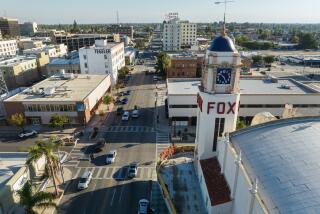USC innovation institute reinventing itself
University of Southern California officials say they have a new way of developing creative ideas that their students and faculty dream up. School officials announced Wednesday that USC is the first major research university with an institute that acts as a university-wide, centralized hub for nurturing inventions as well as inventors.
The institute -- which was previously called the USC Stevens Institute for Technology Commercialization -- was renamed the USC Stevens Institute for Innovation to reflect its shift to include innovations from all academic disciplines.
Established in 2004, the institute was originally designed to help advance engineering after USC alumnus and venture capitalist Mark Stevens and his wife, Mary, donated $22 million to the campus unit.
Stevens said Wednesday that over the next two years the idea grew to a larger vision with a “broader and more aggressive role” for the institute.
“We decided to make this a campuswide resource,” said Stevens, who acknowledged that the institute’s new mission and plans are still in the early stages. “This is a start-up.” He added that the project is “full of unknowns, but that’s what makes it exciting.”
Traditionally, schools tend to focus on inventions and ideas connected to science and technology and ignore others, but officials said all disciplines must be included for maximum benefit to the public’s quality of life. Innovative ideas could also include nonprofit organizations that aid a community. For example, many years ago, a USC professor from the School of Policy, Planning and Development developed the concept of the neighborhood council, according to the institute’s director.
The institute’s 17-member staff will help develop ideas from various areas, such as media, social work, fine arts and medicine.
The mission is about “nurturing ideas and inventions that would benefit society the most,” USC President Steven B. Sample said.
An example of that objective was on display Wednesday as USC School of Dentistry professor Paul C. Denny chatted about how he developed a saliva test that predicts a child’s genetic-based propensity for developing cavities.
The invention is being reviewed by the FDA for approval.
“It was my opportunity to do something for people,” Denny said. “It was like it was a gift.”
About a dozen other inventions by faculty members, some which have been years in the works, were on display at the Davidson Conference Center on Wednesday. The institute has supported the projects through promotion and licensing.
One invention teaches U.S. soldiers cultural awareness through an interactive, 3-D videogame that simulates real social interactions with Iraqi civilians. The invention, which has been used by members of the U.S. military, shows soldiers nonverbal gestures and norms, such as placing your hand over your heart when greeting an Iraqi.
In the spirit of innovation, Provost C.L. Max Nikias also announced he wants to develop in the next year a minor in innovation for all doctoral students, regardless of their discipline.
“I want innovation to be the signature for the USC PhD diploma,” Nikias said.
To oversee the institute’s new effort, USC officials last year recruited Krisztina Holly, a former director of an innovation center at the Massachusetts Institute of Technology.
Holly, a vice provost who said plans call for the USC institute to grow to a 30-member staff by 2008, said one of the institute’s main goals will be to develop the creative thinking -- and not just the inventions -- of students and faculty.
If one of USC’s 33,000 students has an idea, he or she should contact the institute that is housed in the Andrew and Erna Viterbi School of Engineering and speak with an innovator developer to determine if the idea has merit.
Staff at the institute may then encourage the student to take a course in innovation or entrepreneurship or attend one of the institute’s workshops.
The institute staff also plans to offer advice on how to protect, license and patent the idea as well as introduce inventors to volunteer mentors from the community. Awards, grants and educational programs will soon be announced to support student innovators, Holly said.
However, while the institute has several ambitious plans, Holly admits most are in their conceptual stage.
“It is operating in unchartered territory,” Holly said to a crowd of about 100 students, faculty members and school officials who came to hear the institute’s new plans. “We have no road map, and we think that’s great.”
More to Read
Start your day right
Sign up for Essential California for news, features and recommendations from the L.A. Times and beyond in your inbox six days a week.
You may occasionally receive promotional content from the Los Angeles Times.






